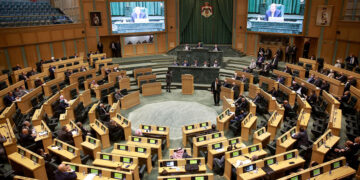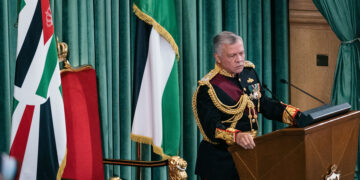One Year Anniversary of King Abdullah II Unlawfully Detaining his Half-brother, Prince Hamzah
UPDATED: We have updated and revised some of the information in this press release based on newly obtained information on January 5, 2024.
(Washington D.C., May 23, 2023) – Jordanian authorities immediately should act to secure the release of Prince Hamzah bin Al Hussain, the former Crown Prince of Jordan, whom King Abdullah has arbitrarily and unlawfully detained incommunicado since April 3, 2021. Having failed to bring charges against Hamzah, review his detention before a judge, or grant him a trial for the past year, Jordanian authorities should release him.
"The ongoing, unlawful detention of Prince Hamzah is a travesty of justice and a window into Jordan's human rights abuses against its citizens under King Abdullah's authoritarian rule," said Sarah Leah Whitson, the Executive Director of DAWN. "It's disappointing that the Biden Administration has done little to pressure the King to respect the basic rights of Jordanians or to even mention the unjust detainment of Prince Hamzah."
Since his house arrest, the King has held Prince Hamzah in his house in the western part of Amman, without family visitation access beyond his wife and six children, according to two sources close to the family whom DAWN interviewed on March 25 and April 2, 2023. One source said that Hamzah's wife, Basmah Hamzah, a Canadian citizen, was officially under house arrest between April 3, 2021 to April 10, 2021.
On May 19, 2022, in a lengthy public message, King Abdullah announced that he had detained his brother under house arrest, without identifying any judicial process or charges against him. The King said that his brother was "influenced by unreasonable thinking" to justify detaining Prince Hamzah, depriving him from meeting people and communicating with anyone, including family members other than his wife and six children. As detailed below, Prince Hamzah's detention followed claims that he was part of a plot to overthrow the King in 2021, and Jordanian authorities have tried and imprisoned two of the men alleged to be part of this plot, Bassem Awadallah, former head of the Royal Court, and Sharif Hassan Bin Zaid, a royal family relative.
Although the King has no constitutional or legal power under Jordanian law to detain anyone, including his brother, he justified his decision by citing a recommendation from a "special council" that the King assembled in December 2022, pursuant to Article Eight of the Royal Family Law of 1937, which allows the King to establish an ad hoc council to "help the King carry out his authorities," with respect to the civil affair of royal family members. However, neither the Royal Family Law nor any other law in Jordan authorizes the special council to arrest or detain anyone, so the council's recommendation to detain Hamzah has no legal weight or bearing.
The council was composed of Prince Ali, a half-brother of the King appointed by the King; the Prime minister, Beshr Khasawneh; the Minister of State for Prime Ministry Affairs, Ibrahim Al Jazi; the Supreme Shariah Court Judge Abed Al Hafiz Irbatah; and the head of the Judicial Council Mohamad Al Ghazo. The council issued its recommendation to confine the prince's communications and movement on December 23, 2021, with no information about when the king asked the council to issue its recommendation.
"It should be crystal clear to all observers that the Special Council whom the King says 'recommended' Hamzah's detention has zero authority under Jordanian law to imprison anyone," said Whitson. "And if the King can get away with detaining even the crown prince of the country with no due process at all, imagine how meaningless due process and fair trial are for ordinary Jordanians."
A Jordanian activist and expert in the country's constitutional law, who asked DAWN not to reveal his name, said that the King's decision to detain Hamzah is not constitutional:
All royal decrees must refer to the law or constitution. The King did not refer to any laws or the constitution for the arrest. Instead, he told a story, justifying the arrest and his decision to detain his half-brother, based on a recommendation of a council that has no constitutional or legal authority to recommend the King to detain anyone indefinitely, including his brother.
Article eight of the Jordanian Constitution states, "No Jordanian can be arrested or held or imprisoned or confined of his freedom except according to the provisions of the law." Under Jordanian law, only judges and prosecutors have the authority to detain citizens, pursuant to the Penal Code. The exception is the Crime Prevention Law of 1954, which gives governors the power to detain people without reliance on the Penal Code.
"Jordan's laws set the rules for the detention of any citizen, identifying who is authorized to issue the detention order, and the requisite charges, the judicial process, the maximum sentence for a crime," a lawyer in Amman told DAWN on the condition of anonymity. "Not a single article in any Jordanian law states that the King has a special power to detain any citizen for an unlimited time outside of these laws, as the King has done with Prince Hamzah."
Background to Detention
On March 15, 2021, former Crown Prince Hamzah visited Al-Salt city, 20 miles west of the capital Amman, after the death of nine COVID-19 patients when the hospital ran out of oxygen. A well-known member of the political opposition in Salt told DAWN in March of this year under condition of anonymity that people in Salt "warmly" received the former Crown Prince in the "condolences houses" where families of COVID victims received visitors, sparking a "royal rift." The Wall Street Journal called the visit "one of the last straws in a long-running rivalry between the king and his younger half-sibling," as the King apparently perceived Prince Hamzah's visit as an attempt to woo popular support for himself.
On April 3, 2021, Jordan's Chairman of Joint Chief of Staff, Major General Yousef Huneiti, visited the prince in his house, officially asking him to stop his "destabilizing activities."
A few days later, Jordanian media reported that the authorities had arrested several people, including the former Chief of the Royal Court, Basem Awadallah, and a royal family relative, Sharif Hassan Bin Zaid, and accused Hamzah and the others of "conspiring against the king" and "sedition," which is rare in Jordan. Jordanian courts tried and sentenced Awadallah and Bin Zaid on July 12, 2021 to 15 years in prison, and they remain imprisoned in the country, but no charges were brought against Hamzah. As of April 10, 2021, his wife and children were allowed to leave the house accompanied by guards.
On April 5, 2021, the Royal Court published an apology letter from Hamzah to the King, stating his loyalty to King Abdullah II and his son Hussain "the current Crown Prince."
On April 3, 2022, nearly one year after the release of the apology letter, Prince Hamzah relinquished his Royal title, stating that his "personal convictions" were "not in line" with Jordan's current institutions. Despite this, the King continued to detain Hamzah.
On April 9, 2021, the U.N. Human Rights High Commissioner Volker Turk raised concerns "about a lack of transparency surrounding the alleged destabilization plot in Jordan involving the monarch's half-brother Prince Hamzah." Since then, there have been no public pronouncements from any U.N. human rights body about the detention of Hamzah and his family.
Jordan is the second largest recipient of U.S. aid, receiving $1.45 billion annually, pursuant to a Memorandum of Understanding announced by the State Department extending $1.45 billion annually to the Kingdom for the fiscal years 2023-2029. This includes $425 million in military assistance, at least $845 million in budget support, and $475 million in "direct cash transfer to the budget," effectively buttressing the monarchical dictatorship's acts without legal or constitutional constraints.
The Biden Administration and Congress should pressure King Abdullah to stop arbitrarily detaining Jordanians without due process and immediately release Hamzah, his wife and his children.
DAWN calls on the U.S. Congress to cease its financial and military assistance to Jordan in light of widespread rights abuses and expanding autocratic royal control of the country that marginalizes the country's Judicial system, as previously documented by DAWN. In 2023, DAWN documented widespread, arbitrary arrests of Jordanian citizens for participating in protests or preemptive arrests to prevent them from participating in protests, as well as the legal attacks against the country's only semi-independent human rights commission and closure of the teacher's union.





































